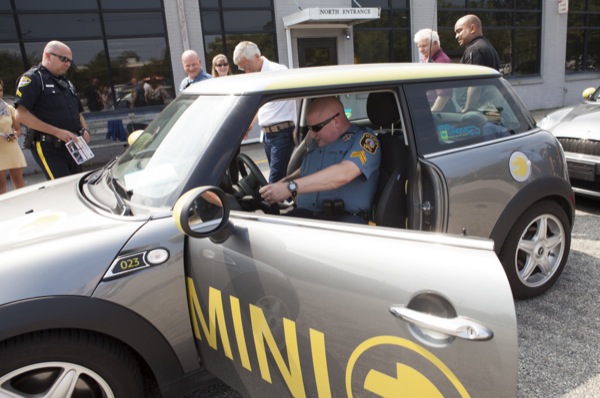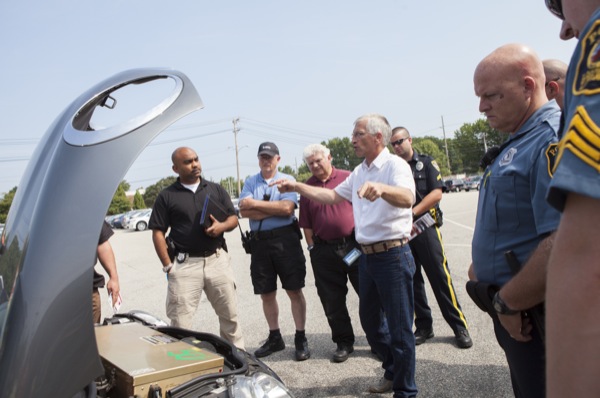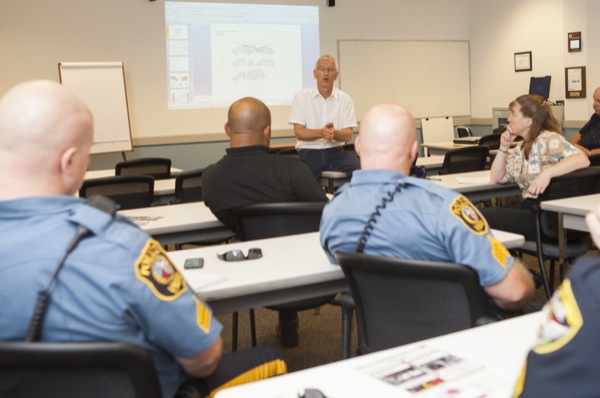Electric vehicle safety
Local police, firefighters trained in safety measures specific to electric cars
1:22 p.m., Aug. 26, 2013--After a car crash, emergency responders know to cut off the fuel before it leaks on the pavement and starts a fire. Some may not be sure, though, where to start when the car is an electric vehicle that runs without gasoline.
“First responders need to know that with a wreck involving an electric vehicle, they should first make sure the power has turned off,” said Willett Kempton, professor in the University of Delaware’s College of Earth, Ocean, and Environment.
Research Stories
Chronic wounds
Prof. Heck's legacy
Kempton is spearheading a project to bring a fleet of electric vehicles into use in the area, including six initially on campus, and he recently organized a training session for local police and firefighters to learn safety precautions. The eco-friendly cars generate no fuel exhaust, and they are part of a field test of pioneering electric vehicle-to-grid technology that uses electric cars to sell power balancing service to the power grid when the cars are parked.
Emergency personnel from the Newark Police Department, Aetna Hose, Hook and Ladder Co. and UD police and emergency units learned the basics of electric vehicles and how the cars’ design varies from their gas-fed counterparts.
“It is safe, and it is not dangerous,” BMW instructor Matthias Kluck told the class. “But there is a difference, and you have to be informed about the differences to make the right decisions.”
Engineered by BMW AG with rigorous safety measures, the cars in UD’s fleet are electric versions of the MINI Cooper. Kluck explained that many areas of the car that would have fuel lines, combustion and exhaust components in the traditional models are replaced with electrical parts. The power electronics for driving the electric motor are sturdily housed in steel in the front end, with related wiring and parts snaking up the middle hump and into the rear of the car, where the lithium ion battery pack is.
The electrical system automatically shuts down if the car is in a crash and the airbags deploy. In the unlikely case that the power needs to be turned off manually, Kluck pointed out several places where that can be done, such as a red knob clearly marked in the trunk.
The electric car is designed to not need coolant, transmission fluid or other liquids, further improving safety.
“In case of an emergency, there are no liquids that can carry electricity to the outside,” Kluck said.
Marty Rogalewicz with Aetna Hose, Hook and Ladder Co. participated in the class and has taken additional safety trainings for hybrid and electric vehicles.
“They’re incredibly safe,” Rogalewicz said. “I think they’re safer than a gas-powered car.”
UD’s fleet will begin with six electric vehicles that can be leased by units on campus. Faculty and staff must receive special training to drive the cars, three of which have been held in the past month. Drivers started to hit the roads last week.
Called “Grid On Wheels: Power Up the Future,” the project is a partnership between the UD’s College of Earth, Ocean, and Environment, BMW AG, NRG Energy, PJM Interconnection, Auto Port Inc., evGrid, Milbank Manufacturing, UD’s Department of Computer and Electrical Engineering and UD’s Office of Economic Innovation and Partnerships.
Article by Teresa Messmore
Photos by Ambre Alexander













